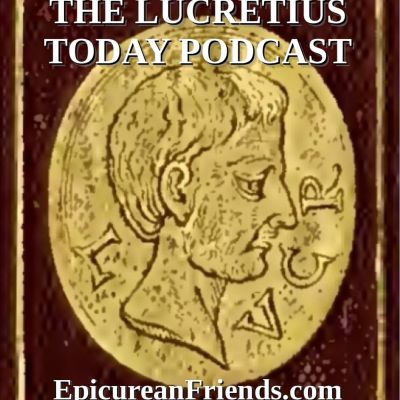Lucretius Today is a podcast dedicated to learning Epicurean philosophy through study of the poet Lucretius, who lived in the age of Julius Caesar and wrote "On The Nature of Things," the only complete presentation of Epicurus' ideas left to us from the ancient world. We'll walk you line by line through the six books of Lucretius' poem, and we'll discuss how Epicurean philosophy can apply to you today. In this podcast we won't be talking about modern political issues. How you apply Epicurus in your own life is entirely up to you. Over at the Epicureanfriends.com web forum, we apply this approach by following a set of ground rules we call "Not Neo-Epicurean, But Epicurean." Epicurean philosophy is not a religion, it''s not Stoicism, it's not Humanism, it's not Libertarianism, it's not Atheism, and it's not Marxism or any other philosophy - it is unique in the history of Western Civilization, and as we explore Lucretius's poem you'll quickly see how that is the case. The home page of this podcast is LucretiusToday...
http://Epicureanfriends.com
Episode 138 - Letter to Menoeceus 05 - On Pleasure (Part One)
Welcome to Episode One Hundred Thirty-Eight of Lucretius Today. This is a podcast dedicated to the poet Lucretius, who wrote "On The Nature of Things," the only complete presentation of Epicurean philosophy left to us from the ancient world. I am your host Cassius, and together with our panelists from the EpicureanFriends.com forum, we'll walk you through the ancient Epicurean texts, and we'll discuss how Epicurean philosophy can apply to you today. We encourage you to study Epicurus for yourself, and we suggest the best place to start is the book "Epicurus and His Philosophy" by Canadian professor Norman DeWitt. If you find the Epicurean worldview attractive, we invite you to join us in the study of Epicurus at EpicureanFriends.com, where you will find a discussion thread for each of our podcast episodes and many other topics. Today we continue our discussion of Epicurus' Letter to Menoeceus, and we begin our discussion of Pleasure. Now let's join Martin reading today's text:
BAILEY:
We must consider that of desires some are natural, others vain, and of the natural some are necessary and others merely natural; and of the necessary some are necessary for happiness, others for the repose of the body, and others for very life.
[128] The right understanding of these facts enables us to refer all choice and avoidance to the health of the body and (the soul’s) freedom from disturbance, since this is the aim of the life of blessedness. For it is to obtain this end that we always act, namely, to avoid pain and fear. And when this is once secured for us, all the tempest of the soul is dispersed, since the living creature has not to wander as though in search of something that is missing, and to look for some other thing by which he can fulfill the good of the soul and the good of the body. For it is then that we have need of pleasure, when we feel pain owing to the absence of pleasure; (but when we do not feel pain), we no longer need pleasure.
[129] And for this cause we call pleasure the beginning and end of the blessed life. For we recognize pleasure as the first good innate in us, and from pleasure we begin every act of choice and avoidance, and to pleasure we return again, using the feeling as the standard by which we judge every good.
And since pleasure is the first good and natural to us, for this very reason we do not choose every pleasure, but sometimes we pass over many pleasures, when greater discomfort accrues to us as the result of them: and similarly we think many pains better than pleasures, since a greater pleasure comes to us when we have endured pains for a long time. Every pleasure then because of its natural kinship to us is good, yet not every pleasure is to be chosen: even as every pain also is an evil, yet not all are always of a nature to be avoided.
[130] Yet by a scale of comparison and by the consideration of advantages and disadvantages we must form our judgment on all these matters. For the good on certain occasions we treat as bad, and conversely the bad as good.
